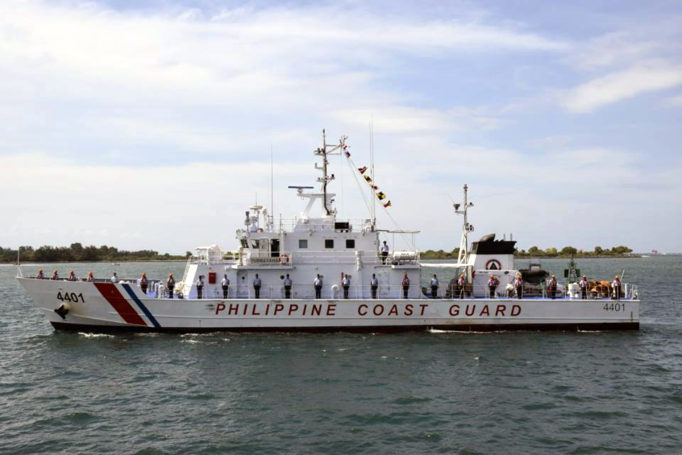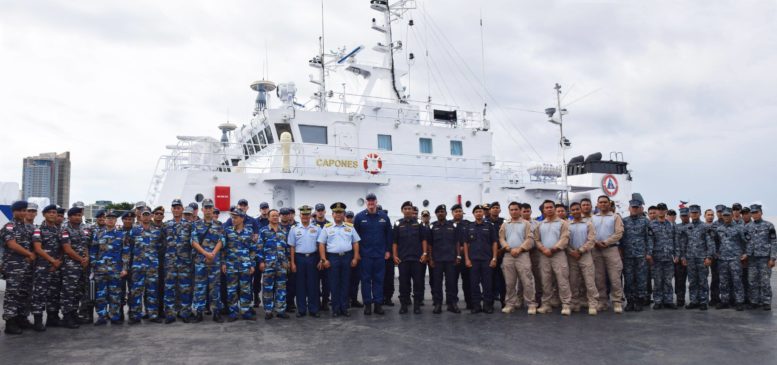The nation and its maritime community join the Philippine Coast Guard (PCG) in commemorating its founding anniversary in October. Originally created as a civilian bureau in 1901 by the United States, the organization assumed its military character in 1967 by virtue of Republic Act 5173. It used to be one of the Philippine Navy’s major units until its separation in 1998 when it reassumed its civilian character. It remains, however, a uniformed service with many of its administrative systems similar to the Armed Forces of the Philippines. In 2009, under Republic Act 9993, the PCG received fresh mandate that covers marine environmental protection, maritime safety, maritime search and rescue, maritime security, and maritime law enforcement.

Parola class patrol boat, multi-role response vessel BRP Tubbataha (MRRV-4401). Photo credit: PCG.
Marine environmental protection is the agency’s core function that aims to prevent, mitigate, monitor and control oil spills in the country’s maritime jurisdiction. Maritime safety involves the promotion of safety of life and property at sea by operating aids to navigation, issuing notice to mariners, removing hazards to navigation, managing vessel traffic separation schemes, and inspecting merchant vessels’ seaworthiness for safe voyage. Maritime search and rescue entails the conduct of prompt and sustained sea operations to locate and assist vessels in distress to save lives and property. Maritime security includes the protection of sea passengers, seafarers and offshore installations from lawless elements, the maintenance of the freedom of navigation in the sea lines of communications (SLOCs), and the preservation of territorial integrity. Maritime law enforcement involves the prevention, detection and suppression of violations of laws, rules and regulations pertaining to immigration, fisheries, quarantine, customs, drug enforcement, human trafficking, firearms and explosives, forestry and other applicable laws in waters subject to Philippine jurisdiction, including transnational crimes.
The multiple functions given to the PCG may require more resources to effectively implement them. As a seagoing agency, PCG’s fleet must be capable of undertaking most, if not all, of those functions. It must consider building a shipyard of its own for intermediate or depot-level maintenance to ensure the operational availability of its floating assets most of which came from different countries. To enhance operational readiness, its fleet may regularly engage the Philippine Navy and the PNP’s Maritime Group in conducting maritime exercises. With some fifteen thousand Philippine-registered vessels plying various sea routes and a few thousands of foreign merchant ships visiting ports annually, the task of securing our archipelagic waters and safeguarding trade and commerce that go through these waters is enormous. The PCG land-based units —type commands, districts and stations— either provide support to or employ the Coast Guard vessels within their geographical or defined area of responsibility.
Attaining high level of operational availability for Coast Guard vessels necessitates well-established systems and procedures. These systems and procedures must be concise, widely circulated, properly implemented, closely monitored and periodically reviewed for possible changes by concerned staff at headquarters level. One of the most important systems that would need a thorough examination is Procurement, for both its physical and human resources. For example, the recent deliveries of six of ten multi-role response vessels (MRRVs) reportedly propelled by marine engines unsuitable for the warm seas surrounding the Philippines may soon affect PCG’s deployment and employment targets, unless corrective measures are undertaken. Also, the indictments of some PCG senior officers several months ago involving procurement matters can provide valuable lessons to avoid similar incidents from happening in the future.
With existing and emerging challenges at the maritime domain, the PCG’s chain of command must continuously assess its organizational relevance, effectively manage its tangible and intangible assets, and truly inspire its human resources. Achieving a noble goal through noble means is the acme of leadership as one author contends. In public governance, the real and continuing challenge is to accomplish the mission by operating within the tight bounds of the law. This would require integrity, intelligence and energy starting from the top leaders, down to the rank and file.
Happy Foundation Anniversary to the Philippine Coast Guard!
